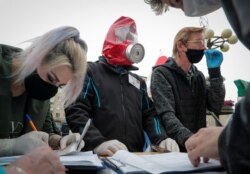As President Alexander Lukashenko prepares for what experts say could be his stiffest election challenge yet, Belarusian authorities have detained at least 20 journalists and bloggers.
In the months leading up to the August 9 election, authorities have arrested opposition presidential candidate Viktor Babaryko on suspicion of financial crimes, and over 100 protesters who were calling for an end to Lukashenko’s 26-year rule.
At least 14 journalists covering the protests were among those detained. On June 23, three were convicted of participating in illegal protests – charges the journalists denied. Separately, about six bloggers were arrested over their blog posts or commentary.
The arrests are seen as a sign that authorities are toughening their crackdown on dissent, said Gulnoza Said, head of the Europe and Central Asia program at the Committee to Protect Journalists, a press freedom nonprofit organization.
Authorities have harassed and arrested journalists during previous elections. In 2010, police raided newsrooms and opened legal cases against outlets ahead of the election and arrested journalists covering protests after the vote.
But this time, Said told VOA, “There is more criticism. There is more discontent among people.”
The Belarus Embassy in Washington did not respond to VOA’s request for comment.
Opposition to Lukashenko’s reelection bid comes in part from economic uncertainties and the country’s handling of the coronavirus pandemic. Belarus has over 62,000 confirmed cases and around 400 deaths.
In public statements and events, the president has called the pandemic a “psychosis” and said “there are no viruses here.”
The Belarusian Association of Journalists has called on authorities to stop harassment of the media.
“The detained journalists followed the requirements of the law — in contrast to the law enforcement officers who grossly violated their rights,” the statement read. “These events have become the quintessence of restrictions on the right to receive and disseminate information and freedom of expression enshrined in the Constitution of the Republic of Belarus.”
Aliaxandr Pazniak and cameraman Siarhei Bahrou, from the independent news website Gantsavitski Chas, were among those convicted. Pazniak was ordered to pay a fine of 804 Belarusian rubles (US $330), and Bahrou was sentenced to 15 days’ detention. A third journalist, freelancer Siarzhuk Latsinsky, was sentenced to 10 days’ detention for participation in an illegal demonstration.
“If [Lukashenko] believes that he is the leader who is supported by the most Belarusians, then he should stop this crackdown and allow the journalists to work freely and safely,” CPJ’s Said told VOA.
The media watchdog Reporters Without Borders (RSF) has called on the European Union to pressure Belarus about the arrests. Minsk is part of the Eastern Partnership Initiative to improve relations between the EU and six Eastern countries.
“In response to this unprecedented show of support for opposition candidates, the authorities are trying to gag the media and keep suppressing all forms of pluralism, both political and journalistic,” Jeanne Cavelier, head of RSF’s Eastern Europe and Central Asia desk, said in the statement.
In RSF’s 2020 World Press Freedom Index, Belarus ranked 153rd out of 180 countries, with 1 being most free.





